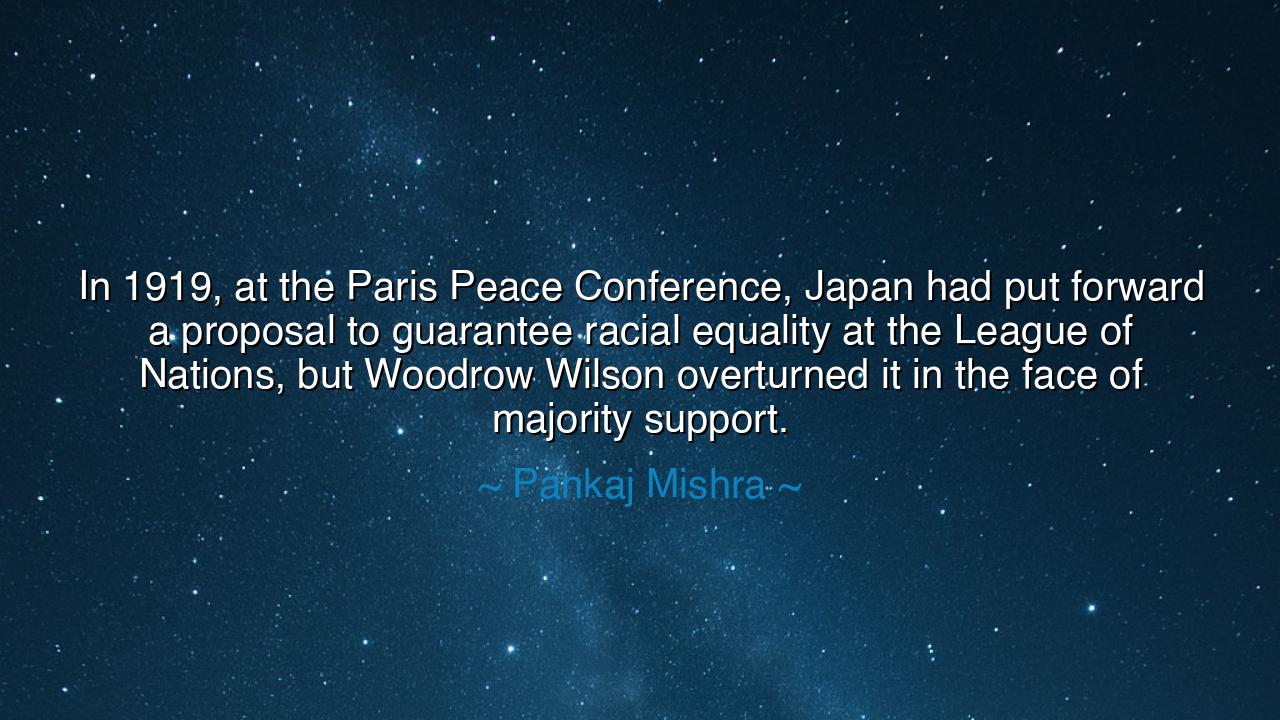
In 1919, at the Paris Peace Conference, Japan had put forward a
In 1919, at the Paris Peace Conference, Japan had put forward a proposal to guarantee racial equality at the League of Nations, but Woodrow Wilson overturned it in the face of majority support.






“In 1919, at the Paris Peace Conference, Japan had put forward a proposal to guarantee racial equality at the League of Nations, but Woodrow Wilson overturned it in the face of majority support.” — Pankaj Mishra
In this haunting and revealing statement, Pankaj Mishra, the historian and essayist, exposes one of the great contradictions of modern history — that the world which spoke of peace and freedom after the Great War was still chained by racial hierarchy and hypocrisy. His words are not simply a record of an event; they are a mirror held up to civilization itself. For in 1919, as the victors gathered in Paris to reshape the world, a great opportunity was lost — an opportunity to affirm that all men, of all nations and colors, were equal before the law of humanity. The Japanese proposal for racial equality, though supported by the majority, was rejected by Woodrow Wilson, the very man who proclaimed the right of all peoples to self-determination. In that moment, the promise of universal justice faltered, and the shadow of empire endured.
To understand the depth of Mishra’s words, one must look to the world as it stood at the end of World War I. Europe lay in ruins, millions were dead, and the leaders of the victorious nations gathered to construct a new order under the banner of the League of Nations. It was meant to be a covenant of peace — a fellowship of nations that would prevent the horrors of war from ever returning. Yet, even in this noble assembly, the old arrogance of empire and race remained unbroken. When Japan, seeking to be recognized as an equal among nations, proposed that the League enshrine the principle of racial equality, it was not only asking for honor — it was asking for the world to awaken.
But the world was not yet ready. Woodrow Wilson, hailed as the prophet of democracy and moral leadership, refused the proposal, fearing it would upset the racial order upon which Western empires — and even his own nation — were built. The United States, still segregated by law, could not proclaim racial equality abroad without confronting injustice at home. And so, under the pretense of preserving unity, the idea was struck down. The majority of nations supported Japan, but Wilson declared that such a measure required unanimous consent — an act of political maneuvering that extinguished the voice of progress. Thus, even as the victors spoke of freedom, they quietly affirmed that freedom was not for all.
This moment in Paris was not merely a diplomatic failure; it was a moral tragedy. It revealed the fault line that still runs through human history — the divide between words and deeds, between the ideal of equality and the practice of dominance. The rejection of Japan’s proposal sowed seeds of resentment across Asia and Africa. The colonized peoples, who had fought and died for the empires in the Great War, saw clearly that the white man’s promise of liberty was not meant for them. In that betrayal, the flames of future struggles were lit — struggles that would later rise in India’s independence movement, in China’s May Fourth protests, and even in Japan’s own pursuit of power and recognition.
The ancients would have seen this as a turning of fate, a moment when hubris blinded nations to wisdom. The Greeks spoke of Nemesis, the goddess who punishes arrogance — and indeed, the arrogance of racial superiority would soon bring ruin again in the form of World War II. Had the League of Nations embraced equality in 1919, perhaps the story of the twentieth century would have been less drenched in blood. But the West’s refusal to extend its ideals to all humanity ensured that resentment would ferment, and that the promise of peace would collapse beneath the weight of hypocrisy.
Yet Mishra’s words are not meant to condemn alone; they are meant to awaken. He reminds us that moral progress must be global or it is false. A peace built on exclusion cannot endure. The leaders of 1919 sought to rebuild nations but neglected to rebuild the human spirit. True peace, as the wise of every age have taught, cannot be founded on conquest or privilege; it must spring from justice. When one race is diminished, all are diminished. When one nation is silenced, all are made deaf to truth.
So let this be the lesson carried forward: justice must never be partial, nor equality conditional. The story of 1919 teaches that noble words, when not matched by noble deeds, become chains instead of wings. Each generation must therefore labor to make its ideals real — to extend the circle of humanity until none are left outside. The rejection of Japan’s plea for racial equality was not merely a failure of one man or one conference; it was the failure of civilization to live up to its own promise. Let us, in our time, not repeat it. Let us ensure that the peace we build, the laws we uphold, and the rights we defend, belong not to one people or one color, but to all who share the breath of life. Only then will the words “equal justice” cease to be an aspiration and become, at last, a truth.






AAdministratorAdministrator
Welcome, honored guests. Please leave a comment, we will respond soon